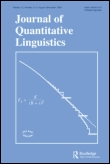
Journal of Quantitative Linguistics
Scope & Guideline
Innovating Language Study with Empirical Precision
Introduction
Aims and Scopes
- Quantitative Analysis of Linguistic Structures:
The journal emphasizes the quantification of various linguistic structures, including syntax, morphology, and phonetics, utilizing statistical models to reveal patterns and trends in language use. - Cross-Linguistic Studies:
There is a consistent focus on comparative studies across different languages, exploring how quantitative methods can uncover universal linguistic principles and language-specific features. - Application of Information Theory:
The journal frequently employs information-theoretic approaches to analyze linguistic complexity, redundancy, and distribution patterns, offering insights into the functional aspects of language. - Empirical Research with Diverse Data Sources:
Research often utilizes corpora from various genres and registers, including social media, academic texts, and spoken discourse, indicating a commitment to empirical data collection and analysis. - Theoretical Contributions to Linguistics:
In addition to empirical studies, the journal also publishes theoretical discussions that advance the understanding of linguistic phenomena through quantitative frameworks.
Trending and Emerging
- Application of the Menzerath-Altmann Law:
There is a notable increase in studies applying the Menzerath-Altmann Law, particularly in various languages and contexts, suggesting a growing interest in understanding linguistic complexity and structure across different levels. - Exploration of Digital Communication and Emojis:
Research focusing on the linguistic properties of digital communication, including the use of emojis on social media platforms, is on the rise, reflecting the impact of technology on language use. - Interdisciplinary Approaches:
Emerging studies increasingly draw from fields such as psychology, information theory, and computational linguistics, indicating a trend towards interdisciplinary research that enriches quantitative linguistic analysis. - Modeling Language Change and Complexity:
There is a growing interest in modeling language change and complexity through advanced statistical and computational methods, as researchers seek to understand the dynamics of language evolution. - Quantitative Discourse Analysis:
The journal is seeing an increase in quantitative approaches to discourse analysis, particularly in examining spoken and written communication in diverse contexts, which underscores the relevance of quantitative methods in understanding discourse patterns.
Declining or Waning
- Traditional Linguistic Analysis without Quantitative Methods:
There seems to be a waning interest in purely qualitative linguistic analyses, as the journal increasingly prioritizes studies that incorporate quantitative methodologies. - Focus on Individual Language Features:
Research that concentrates solely on individual linguistic features, such as specific phonetic or syntactic elements without a broader quantitative context, is appearing less frequently. - Historical Linguistics without Quantitative Backing:
Studies in historical linguistics that do not utilize quantitative approaches may be declining, as the journal favors research that can offer empirical data and statistical validation.
Similar Journals
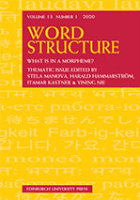
Word Structure
Illuminating the Dynamics of Word FormationWord Structure is a premier journal published by Edinburgh University Press, specializing in the dynamic field of linguistics and language studies. Since its inception in 2008, this journal has carved a niche within the academic community, achieving an impressive Q1 ranking in the Linguistics and Language category for 2023, further affirming its reputation as a leading platform for innovative research. With its robust rankings in both the arts and humanities and social sciences spheres, positioned in the top percentiles, Word Structure serves as an essential resource for linguists, researchers, and students interested in the intricate mechanisms of word formation and morphology. Although it does not offer open access, the journal is dedicated to advancing the understanding of linguistic theory and empirical findings, making significant contributions to ongoing discussions in the field. By facilitating scholarly dialogue and promoting high-quality research, Word Structure plays a crucial role in shaping contemporary linguistics and enhancing the academic discourse surrounding language structures.

Language and Linguistics
Shaping the Future of Linguistics, One Article at a TimeLanguage and Linguistics is a leading academic journal published by ACAD SINICA, INST LINGUISTICS, based in Taiwan. Established in 2008, this journal has rapidly gained recognition within the field of linguistics, achieving a commendable ranking of Q2 in the 2023 category quartiles and holding positions in the top percentiles of Scopus rankings for both Arts and Humanities and Social Sciences. With an ISSN of 1606-822X and an E-ISSN of 2309-5067, the journal aims to foster the development of linguistics research by providing a platform for the dissemination of innovative and interdisciplinary studies. While it currently operates on a traditional subscription model, its significant contribution to the advancement of linguistic theory and its applications makes it an invaluable resource for researchers, professionals, and students alike. Spanning converged years from 2008 to 2024, Language and Linguistics continues to shape the dialogue in understanding language phenomena and encourages submissions that push the boundaries of current linguistic knowledge.
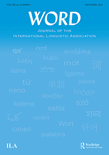
WORD-JOURNAL OF THE INTERNATIONAL LINGUISTIC ASSOCIATION
Championing high-quality research to inspire linguistic innovation.WORD-JOURNAL OF THE INTERNATIONAL LINGUISTIC ASSOCIATION is a leading peer-reviewed journal dedicated to advancing the field of linguistics and language studies. Published by Routledge Journals, Taylor & Francis Ltd, this esteemed journal has earned a reputation for its rigorous scholarship, reflected in its 2023 Q2 ranking in Linguistics and Language and its solid performance in Scopus Ranks. Encompassing a wide range of topics—from theoretical frameworks to empirical research—WORD serves as an essential resource for linguistics researchers, educators, and students alike. While currently not operating under an open access model, the journal is committed to providing high-quality, impactful research articles that contribute significantly to the linguistic community. With its convergence periods from 1998 to 2009 and 2015 to 2024, WORD continuously fosters the discourse of language studies, ensuring that critical insights and discussions are accessible for ongoing academic exploration.
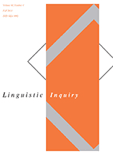
LINGUISTIC INQUIRY
Unraveling the Complexities of Language ScienceLINGUISTIC INQUIRY is a premier journal published by MIT PRESS, representing a critical platform for the advancement of research in the fields of linguistics and language studies. With an impressive Q1 category ranking in both linguistics and language disciplines for 2023, and ranking #149 in Arts and Humanities and #174 in Social Sciences according to Scopus metrics, this journal stands at the forefront of academic conversations around language theory, analysis, and application. LINGUISTIC INQUIRY caters to a diverse audience of researchers, professionals, and students, providing a robust forum for original research articles and theoretical discussions that push the boundaries of our understanding of language. While the journal currently does not offer open access, it remains an essential resource for those engaged in cutting-edge linguistic research. The journal's continuous publication since 1996 demonstrates its long-standing commitment to linguistic scholarship and innovation.

Cadernos de Estudos Linguisticos
Exploring the nuances of language for a global audience.Cadernos de Estudos Linguisticos, published by UNIV ESTADUAL CAMPINAS, INST ESTUDOS LINGUAGEM, stands as a pivotal platform in the field of linguistic studies since its inception in 1978. With its commitment to Open Access, this journal fosters the dissemination of cutting-edge research, ensuring that knowledge is accessible to a global audience. This also enhances collaboration among researchers, professionals, and students dedicated to exploring the nuances of language. The journal proudly carries the ISSN 0102-5767 and E-ISSN 2447-0686, attesting to its uninterrupted quality and relevance in linguistic scholarship. By addressing various facets of language studies, including syntax, semantics, and sociolinguistics, this esteemed journal is a vital resource for advancing understanding and innovation in the field.
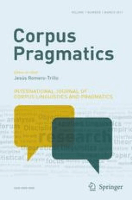
Corpus Pragmatics
Innovating Linguistic Research with Computational PerspectivesCorpus Pragmatics is an esteemed academic journal published by SpringerNature, focusing on the interdisciplinary field of linguistics and its applications within the realms of computer science and social sciences. With a strong foundation since its inception in 2017, the journal has made significant strides, earning recognition with a Q2 rating in Linguistics and Language and a Q3 in Computer Science Applications as of 2023. The journal's impressive Scopus rankings highlight its impact, placing it in the 86th percentile among language and linguistics journals. Corpus Pragmatics aims to bridge the gap between empirical research and theoretical insights, fostering an environment that promotes innovative approaches to understanding the complexities of language use in a digital age. As an open-access platform, it provides researchers, professionals, and students with invaluable resources to enhance their work and engage with the latest findings in the field. With a commitment to quality and relevance, Corpus Pragmatics stands out as a vital resource for advancing knowledge in linguistics and its computational applications, making significant contributions to both academia and industry.

Snippets
Catalyzing academic conversations with open-access research.Snippets is an esteemed academic journal published by LED EDIZIONI UNIV, known for its commitment to advancing knowledge across various disciplines. The journal, which carries the ISSN 1590-1807, serves as a crucial platform for researchers, professionals, and students in the fields of humanities, social sciences, and applied sciences. With an increasing emphasis on open-access content, Snippets offers a wealth of information and insights aimed at fostering academic dialogue and innovation. Although specific metrics like impact factor and H-index are yet to be established, the journal is dedicated to providing high-quality research outputs that contribute to the enrichment of scholarly pursuits. Based in Milan, Italy, Snippets welcomes contributions from a diverse range of perspectives, thus enhancing interdisciplinary collaboration and promoting a deeper understanding of contemporary issues.

Glossa-A Journal of General Linguistics
Championing Innovative Scholarship in LinguisticsGlossa: A Journal of General Linguistics, published by the Open Library of Humanities, stands as a leading voice in the realm of linguistic research since its inception in 2016. With its Q1 category ranking in Linguistics and Language and impressive Scopus ranks encompassing the top 83rd and 81st percentiles in its respective fields, Glossa fosters a vibrant academic community committed to the rigorous exploration of language and linguistic theory. Operating under an open access model, the journal not only enhances the visibility of groundbreaking research but also ensures that valuable insights are accessible to a global audience. The journal's commitment to interdisciplinary dialogue makes it an indispensable resource for scholars, professionals, and students eager to engage with contemporary developments in linguistics. As it converges into 2024, Glossa continues to champion innovative scholarship and critical discourse that challenges conventional boundaries within the field.
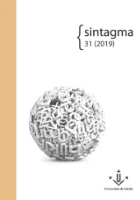
Sintagma
Fostering Academic Dialogue in Linguistics.Sintagma is a prominent academic journal dedicated to advancing the field of Linguistics and Language, published by the Universitat de Lleida in Spain. With an ISSN of 0214-9141 and an E-ISSN of 2013-6455, this journal has established itself as an open-access platform since 1989, thereby ensuring wide accessibility and dissemination of research. The journal's commitment to quality is reflected in its ranking within the Q4 quartile of Linguistics and Language in 2021 and a similar standing in Social Sciences and Arts and Humanities, which underscores its emerging importance in these fields despite recent challenges. Covering topics that span theoretical inquiries to applied linguistic studies, Sintagma invites researchers, professionals, and students to contribute to and engage with its evolving landscape from its unique academic perspective. With the convergence of research years from 2011 to 2018 and upcoming issues through 2024, the journal remains poised to provide insightful content that addresses the linguistic dimensions of contemporary society.
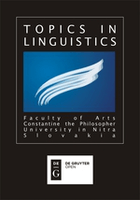
Topics in Linguistics
Innovating Insights into Language and SocietyTopics in Linguistics is a premier academic journal published by SCIENDO, specializing in the dynamic and expansive field of linguistics. With its Open Access model adopted since 2013, this journal ensures that groundbreaking research is readily accessible to scholars and enthusiasts alike, fostering collaboration and advancement in language studies. Indexed in prominent databases, it holds a Q2 ranking in the linguistics category for 2023, indicating its influence and relevance within the academic community. Hailing from Germany, the journal has established a strong international presence, ranking #291 out of 1088 in Arts and Humanities and #349 out of 1167 in Social Sciences—placing it in the top 25% of journals within these fields. Topics in Linguistics serves as a vital platform for researchers to disseminate innovative findings and engage with ongoing debates in the linguistics landscape, making it an essential resource for students, professionals, and academics committed to exploring the intricate layers of language and communication.